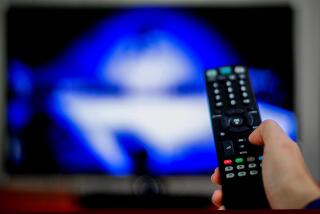Cable TV Rates Down by 8%, Survey Finds : Media: FCC studied changes by the largest providers since new rules took effect. Critics call the preliminary findings flawed.
- Share via
WASHINGTON — In the wake of new federal rules limiting cable television rate increases, monthly fees have dropped about 8%, according to a preliminary survey of operators serving about 15% of the nation’s 58 million cable subscribers.
But the study, released Thursday by the Federal Communications Commission, may do little to settle the dispute over the direction of cable fees. The preliminary survey examined only the largest cable operators and did not report rate changes in any cable system that reconfigured its channels into separately priced “a la carte” offerings in response to the FCC’s pricing restrictions on basic cable service.
Interim FCC Chairman James H. Quello promised that his agency will issue a more extensive report next month. But he indicated that the preliminary data still being collected on other cable systems suggests that those offering a la carte service are also lowering rates.
“The initial results are very close to these” being reported now, Quello said. “But we want to have the full facts before we conclude anything.”
When it announced a rollback of cable rates in April, the FCC said its goal was to cut cable bills an average of 10%, generating about $1 billion in annual savings for consumers.
But the rate regulations, which went into effect Sept. 1, quickly came under attack from cable customers who saw their bills rise rather than fall. Critics questioned whether the rules were working.
The rancor led to a congressional hearing last month, where lawmakers convened to find out what had gone awry with a measure they overwhelmingly passed last October, overriding a veto by then-President George Bush. In response to the misgivings, the FCC began collecting rate information from the 10 largest local systems of the nation’s 25 largest cable operators.
The preliminary results reported Thursday found that 68% of the subscribers to systems owned by these operators had rate reductions, while 31% had a rate increase. The average bill for regulated cable TV services declined $2, or about 8%, and subscribers received, on average, 6% more channels.
Bradley Stillman, legislative director for the Consumer Federation of America in Washington, criticized the preliminary survey results as unreliable. He said the FCC’s sample was too small and too narrowly focused on the biggest cable companies while excluding small and medium-size operators that are governed by less restrictive price rules.
He also said that based on talks with cable operators, most of the fee decreases stemmed from reductions in equipment charges, not basic rates. For example, the FCC reported that monthly charges for remote controls dropped nearly 90% and that additional outlet charged dropped about 95%.
More to Read
The biggest entertainment stories
Get our big stories about Hollywood, film, television, music, arts, culture and more right in your inbox as soon as they publish.
You may occasionally receive promotional content from the Los Angeles Times.









